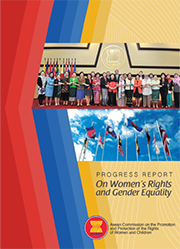ASEAN Commission on the Promotion and Protection of the Rights of Women and Children (ACWC)
The ASEAN Commission on the Promotion and Protection of the Rights of Women and Children (ACWC) advanced as a consultative intergovernmental human rights mechanism during the 16th ASEAN Summit in 2010. ACWC, which is under the ASEAN Ministerial Meeting on Social Welfare and Development (AMMSWD), seeks to promote the well-being, development, empowerment, participation of women and children in the ASEAN Community building process, and public awareness and education of their rights.
It comprises of 20 representatives, two from each of the ASEAN member states – one women’s rights representative and one children’s rights representative. The ACWC meets at least twice a year and can hold additional meetings on special topics, if required. The ACWC’s mandate aligns with the UN Convention on the Elimination of All Forms of Discrimination against Women (CEDAW) and the Convention on the Rights of the Child (CRC).
The ACWC is responsible for:
- Promoting the implementation of international instruments, ASEAN instruments and other instruments related to the rights of women and children
- Developing policies, programmes and innovative strategies to promote and protect the rights of women and children to complement the building of the ASEAN Community
- Promoting public awareness of and education on the rights of women and children in ASEAN
- Advocating on behalf of women and children, especially the most vulnerable and marginalized, and encourage ASEAN member states to improve their situation
- Building the capacities of relevant stakeholders at all levels— administrative, legislative, judicial, civil society, community leaders, women and children mechanisms, through the provision of technical assistance, training and workshops—towards the realization of the rights of women and children
- Encouraging ASEAN member states to undertake periodic reviews of national legislation, regulations, policies and practices related to the rights of women and children
- Facilitating the sharing of experiences and good practices, including thematic issues, between and among ASEAN member states related to the situation and well-being of women and children and to enhance the effective implementation of the CEDAW and the CRC through, among other things, exchange visits, seminars and conferences
- Encouraging ASEAN member states to consider acceding to, and ratifying, international human rights instruments related to women and children
- Supporting the participation of ASEAN women and children in dialogue and consultation processes in ASEAN related to the promotion and protection of their rights
The President of the Republic of the Philippines appoints the two ACWC representatives, with a 3-year term each. The PCW provides budgetary, logistical and administrative support to the ACWC women’s rights representative. Meanwhile, the Department of Social Welfare and Development (DSWD) provides the same support to the ACWC children’s rights representative.
Prof. Aurora Javate-de Dios of the Miriam College Women and Gender Institute (WAGI) served as the Philippines’ ACWC women’s rights representative for two terms (2010-2016). One of her notable accomplishments is spearheading the Progress Report on Women’s Rights and Gender Equality. The report is considered a baseline document against which future assessments on the women’s situation in ASEAN can be made.
Since 2017, the ACWC women’s rights representative is Dr. Lourdesita Sobrevega-Chan, Chairperson of the University Research Council (URC) of the Ateneo de Davao University.

Projects that were led and implemented by the Philippines in accord with the ACWC’s objectives are:
- Progress Report on Women’s Rights and Gender Equality
- Fulfillment of the Report on Institutional Strengthening of the ACWC
- Review of emerging legislations and legal enforcement concerning elimination of cyber/online-based VAW and VAC
- Gender, Peace and Security: Advancing Women’s Roles in Peace Mediation in Southeast Asia – Progress, Opportunities and Challenges
- Scoping Study on Strengthening the Protection and Empowerment of Women Migrant Workers in Crisis and Disaster Situations
- Development of Guidelines on Non-Gender Stereotyping in Curriculum and Textbook Writing for Higher Education Level

